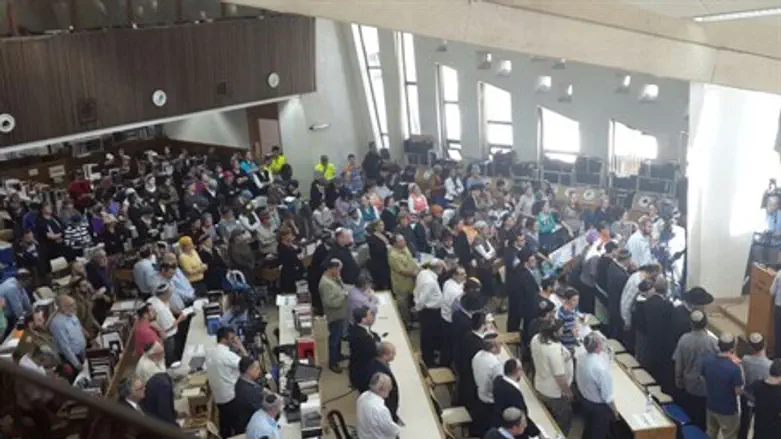
Thousands of mourners converged Tuesday morning on the small town of Alon Shvut in Gush Etzion, south of Jerusalem, to pay their respects to Rabbi Aharon Lichtenstein, a leading figure in the religious-Zionist and Modern Orthodox world who passed away Monday morning after a long illness, aged 81. From there, the funeral procession will move to the Har Hamenuchot cemetery in Jerusalem, where Rabbi Lichtenstein will be laid to rest.
Rabbi Lichtenstein's funeral began in Alon Shvut, where he headed the Har Etzion Yeshiva for nearly half a century since making aliyah from the US in 1971. Police estimate that at least 10,000 people are in attendance; thousands more have arrived since the funeral began.
The funeral began with a stirring eulogy from R' Lichtenstein's son, R' Moshe.
"Your students were your children, and your children were your students," he said tearfully.
"You were a scholar and a devoted father," he continued. "You've set up an entire world."
"One morning I saw you sitting in a room deep in a phone call and I did not understand why you did not go for morning prayers," he recounted. "When you finished you told me that was a mother whose son was murdered in a terrorist attack, and did not even know you, and you give her support and guidance."
R' Moshe spoke about R' Lichtenstein's dedication to his students, the yeshiva, and especially his family. He also elucidated about the Rabbi's great achievements in Torah and the Jewish world, his role in officiating ceremonies and teaching in the Alon Shvut community, and noted that serving G-d was the "basis of [his] existence."
"There wasn't a single gap in who he was in private or in public," R' Moshe added.
R' Yitzhak Lichtenstein spoke specifically about his father's humility.
Explaining that his father always taught the dictum of being moderate in all ways - except for humility and anger, two sides of the same spectrum - R' Yitzhak added that his father was "never angry in his life."
"My father always gave a person the benefit of the doubt. He had a good eye," Rabbi Yitzhak said, adding, "My father did not know what anger was. He never engaged in slander or small talk. He was diligent; he and the Torah were as one, but despite this he never turned anyone away, receiving them hospitably and never letting visitors feel as if they were bothering him."
Rabbi Meir Lichtenstein, R' Aharon's son, gave a eulogy as well, focusing on his humility and patience.
"Last summer a team of emergency management team came to Gush Etzion. Father said, 'Only electricity is considered an emergency? Studying of Torah isn't urgent? You have come to the yeshiva in order to study.', Rabbi Meir shared.
"You were always a ner tamid [a constant light - ed.]," Rabbi Meir said. "Many wanted to learn from you and hear your Torah words, but you were so humble. You had a big heart."
Rabbi Lichtenstein's daughter, Esther Rosenberg, said that her father was a "chain of smiles, of studying Torah in the living room, of family vacations and economic struggles."
She recounted fondly that Rabbi Lichtenstein, despite being a Torah scholar, still washed dishes for the family before Shabbat, bounced grandchildren on his knees, and even made animal noises with them, she said. "We feel very grateful and fortunate with the time we had with him," she added.
Rosh Yeshiva (dean) Rabbi Baruch Gigi, said Rabbi Lichtenstein "was a pillar of Torah, a Torah giant along with his deep worldy and philosophical knowledge."
"All his lessons were a work of art, were the artist made a deep and fundamental analysis, which examines the different angles of the subject," he added.
Torah leader
Born in Paris on May 1933, shortly after the Nazi conquest of France in 1940 his family fled to the US, where he would eventually study under two of the Jewish world's leading rabbis: Rabbi Yitzhak Hutner and Rabbi Yoseph Soloveitchik.
He soon became a close student of Rabbi Soloveitchik in particular - considered the founder of the Modern Orthodox movement - studying for many years under his guidance at Yeshiva University in New York.
In 1959 Rabbi Lichtenstein was ordained by his mentor, and shortly after married Rabbi Soloveitchik's daughter Tova.
In 1970 he was invited by Rabbi Yehuda Amital to co-head Yeshivat Har Etzion, which Rabbi Amital himself founded in 1968. The yeshiva - which today has around 500 students and thousands of alumni - was one of the first hesder yeshivot, which combine Torah study and IDF military service.
Rabbi Lichtenstein took up the position a year later upon making aliyah with his family, and served as one of its Rosh Yeshiva until his passing, although in recent years he had scaled back his activities due to poor health.
Rabbis and students alike mourned the passing of an intellectual and spiritual giant who "revolutionized Torah study", particularly for English-speakers, while simultaneously remaining a remarkably humble and likable figure on a personal level.
Prime Minister Binyamin Netanyahu also eulogized him Monday, lamenting the loss of "a Zionist Torah leader of the highest order."
Among the mourners are thousands of former students who studied under Rabbi Lichtenstein both from within Israel and from Diaspora - many of the latter group having flown in specifically to pay their final respects.
